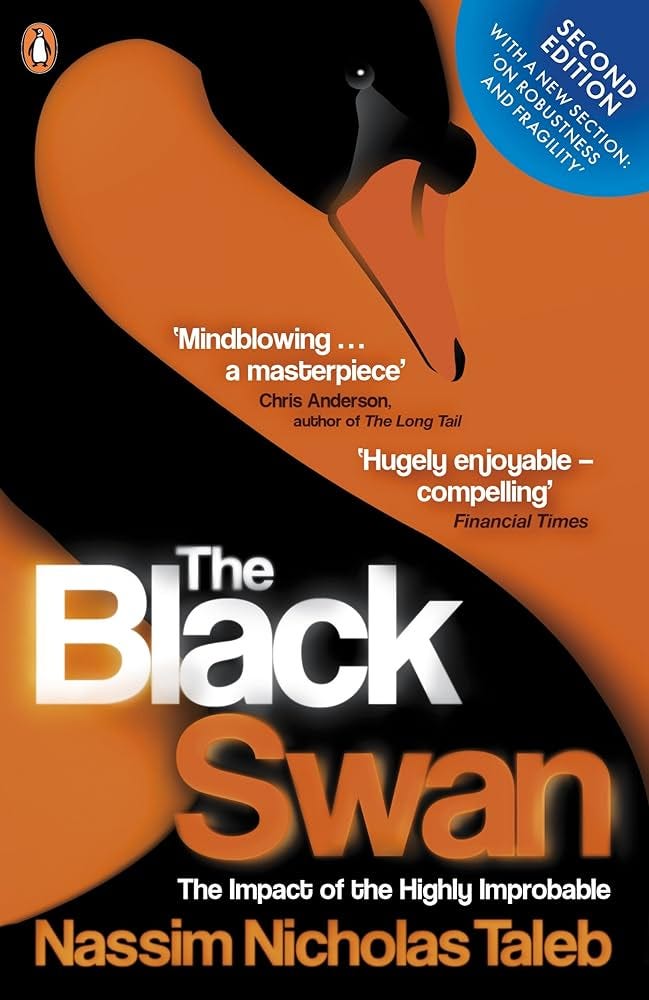I have long been intrigued by paradox, mystery, and uncertainty. It’s in large part why I’m a fan of Nassim Taleb’s seminal work, "The Black Swan: The Impact of the Highly Improbable.”
Taleb's book is a profound exploration of the rare and unpredictable events — what he affectionately refers to as Black Swans—that have massive impacts on our lives.
These events are outliers, beyond the realm of regular expectations, and yet, once they occur, they are often rationalized with the benefit of hindsight.
As we navigate the complexities of the 21st century, "The Black Swan" is an essential read, offering critical insights into uncertainty, risk, and the fragile nature of our knowledge.
The Essence of the Black Swan
Taleb’s concept of the Black Swan challenges our understanding of the world. Black Swans are characterized by three attributes: rarity, extreme impact, and retrospective predictability. Taleb argues that much of our understanding of the world is distorted by these events, which we often fail to anticipate due to our inherent biases and reliance on historical data.
The 2008 financial crisis and the COVID-19 pandemic are examples of Black Swans—events that were unforeseen but had enormous consequences globally.
Prevailing Examples
In today’s current socio-political landscape, the relevance of "The Black Swan" cannot be overstated. As we grapple with rapid technological advancements, geopolitical tensions, and environmental uncertainties, the lessons from Taleb’s work are more pertinent than ever.
Our world is marked by a profound interconnectedness and complexity, where a single unforeseen event can trigger cascading effects across global systems. It’s here where understanding and preparing for Black Swans becomes crucial for both individuals and institutions aiming to build resilience in the face of uncertainty.
The Kamala Harris Scenario: A Contemporary Black Swan?
Consider the hypothetical scenario involving Democratic presidential candidate Kamala Harris. Imagine a Black Swan event where Harris, through an unexpected turn of events, becomes the catalyst for a major political upheaval.
This could occur through a surprising electoral victory, a groundbreaking policy initiative, or an unprecedented political scandal. Such an event would not only reshape the political landscape but also have profound implications for social, economic, and international relations.
Harris, a trailblazing figure as a woman of color in the highest echelons of American politics, already represents a break from historical norms. Should she navigate through or even generate a Black Swan event, it would highlight the unpredictable nature of modern politics.
This scenario underscores Taleb’s argument that we must always be prepared for the unexpected and recognize that the most significant events in history are those that defy our predictions.
Key Lessons from "The Black Swan
1. Embrace Uncertainty: Taleb urges us to acknowledge and embrace the inherent uncertainty in our lives. Rather than relying solely on predictive models, we should develop strategies that allow us to thrive amidst unpredictability. This involves building systems that can withstand shocks while adapting swiftly to changing circumstances.
2. Beware of the Narrative Fallacy: Our tendency to create coherent stories out of random events can lead to a false sense of understanding and control. Taleb warns against this narrative fallacy, encouraging us to accept that not everything can be neatly explained or predicted.
3. Antifragility: One of Taleb’s most significant contributions is the concept of antifragility—the idea that some systems benefit and grow from disorder and volatility. Embracing antifragility means creating structures that not only endure uncertainty but also harness it for growth and improvement.
Throughout "The Black Swan,” Taleb's insights compel us to rethink how we approach risk, make decisions, and build our lives and societies. In an era where Black Swan events seem increasingly frequent, his work serves as a guide for navigating the unknown.
As we consider the potential for a Black Swan scenario involving figures like Kamala Harris, we are reminded that the future is inherently unpredictable. By internalizing the lessons from Taleb’s work, we can better prepare ourselves for the surprises that lie ahead, turning uncertainty into an opportunity for innovation and resilience.
In this way, "The Black Swan" remains a vital and transformative read for our times, urging us to rethink the way we perceive and interact with the world around us.
Since January of 2020, Great Books, Great Minds has provided subscribers community, connection and conversation around books for free—no paywall.
But our future relies on you. At $6.00/month or $60.00 per year, please help me sustain our vision of impacting one million readers worldwide by 2030.
Diamond Michael Scott, Global Book Ambassador and Influencer



